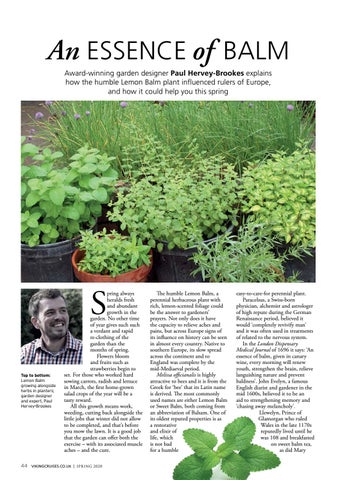An ESSENCE of BALM Award-winning garden designer Paul Hervey-Brookes explains how the humble Lemon Balm plant influenced rulers of Europe, and how it could help you this spring
S
Top to bottom: Lemon Balm growing alongside herbs in planters; garden designer and expert, Paul Hervey-Brookes
44
pring always heralds fresh and abundant growth in the garden. No other time of year gives such such a verdant and rapid re-clothing of the garden than the months of spring. Flowers bloom and fruits such as strawberries begin to set. For those who worked hard sowing carrots, radish and lettuce in March, the first home-grown salad crops of the year will be a tasty reward. All this growth means work, weeding, cutting back alongside the little jobs that winter did not allow to be completed, and that’s before you mow the lawn. It is a good job that the garden can offer both the exercise – with its associated muscle aches – and the cure.
VIKINGCRUISES.CO.UK | SPR ING 2020
The humble Lemon Balm, a perennial herbaceous plant with rich, lemon-scented foliage could be the answer to gardeners’ prayers. Not only does it have the capacity to relieve aches and pains, but across Europe signs of its influence on history can be seen in almost every country. Native to southern Europe, its slow spread across the continent and to England was complete by the mid-Mediaeval period. Melissa officianalis is highly attractive to bees and it is from the Greek for ‘bee’ that its Latin name is derived. The most commonly used names are either Lemon Balm or Sweet Balm, both coming from an abbreviation of Balsam. One of its oldest reputed properties is as a restorative and elixir of life, which is not bad for a humble
easy-to-care-for perennial plant. Paracelsus, a Swiss-born physician, alchemist and astrologer of high repute during the German Renaissance period, believed it would ‘completely revivify man’ and it was often used in treatments of related to the nervous system. In the London Dispensary Medical Journal of 1696 it says: ‘An essence of balm, given in canary wine, every morning will renew youth, strengthen the brain, relieve languishing nature and prevent baldness’. John Evelyn, a famous English diarist and gardener in the mid 1600s, believed it to be an aid to strengthening memory and ‘chasing away melancholy’. Llewelyn, Prince of Glamorgan who ruled Wales in the late 1170s reputedly lived until he was 108 and breakfasted on sweet balm tea, as did Mary



















